We are two years late in posting this. Nevertheless, it seems like a worthwhile bit of silliness for a Friday afternoon. Back in 2020, a deadly virus was running rampant across the globe. Performance venues and even rehearsals were shut down. But – the members of the shanty and sea song-singing group Bounding Main knew that “Life … finds a way.” Here is their pandemic T-Rex quintet singing the shanty “Strike the Bell.”
 Last March, we posted about the grounding of the container ship Ever Forward near Baltimore in the Chesapeake Bay. The ship failed to make a turn in the Craighill channel and ran hard aground on a mud flat, where it remained stuck for more than 35 days. At the time, we noted that it was unclear whether human error or a mechanical failure caused the casualty. The Ever Forward had a pilot aboard at the time of the grounding.
Last March, we posted about the grounding of the container ship Ever Forward near Baltimore in the Chesapeake Bay. The ship failed to make a turn in the Craighill channel and ran hard aground on a mud flat, where it remained stuck for more than 35 days. At the time, we noted that it was unclear whether human error or a mechanical failure caused the casualty. The Ever Forward had a pilot aboard at the time of the grounding.
The Coast Guard has now answered that question. Their accident investigation report “determined the incident’s causal factors to be the pilot’s failure to maintain situational awareness and attention while navigating, and inadequate bridge resource management.” They found that the accident was due to the pilot’s inattention while on his cell phone including sending texts, making a series of phone calls, and drafting an email while the ship was underway.
An interrupted broadcast of a football game, a newsbreak during a performance by the New York Philharmonic, a weather report followed by an announcement from President Roosevelt that Japan had bombed Pearl Harbor. Reports of attacks on the Philippines. Here is a compilation of news reports from Sunday, December 7th, 1941, eighty-one years ago today.
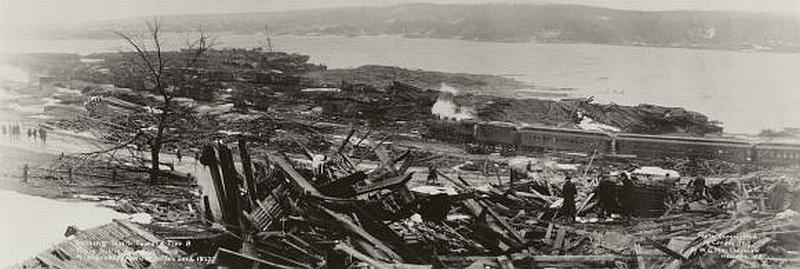 One hundred and five years ago today, on the morning of December 6, 1917, the French freighter SS Mont-Blanc and the SS Imo, a Norwegian ship chartered to carry relief supplies to Belgium, collided in the Narrows, a strait connecting the upper Halifax Harbour to Bedford Basin. The collision at first seemed minor, the two ships hitting at only about a knot.
One hundred and five years ago today, on the morning of December 6, 1917, the French freighter SS Mont-Blanc and the SS Imo, a Norwegian ship chartered to carry relief supplies to Belgium, collided in the Narrows, a strait connecting the upper Halifax Harbour to Bedford Basin. The collision at first seemed minor, the two ships hitting at only about a knot.
Nevertheless, a fire broke out aboard the Mont-Blanc, which was loaded with munitions and high explosives. The fire burned out of control and ignited the cargo, causing the largest man-made explosion the world had ever seen prior to the nuclear age. Roughly 2,000 died and 9,000 were injured. Many thousands more were made homeless. Large sections of Halifax, Nova Scotia were leveled. A tsunami created by the blast wiped out the community of Mi’kmaq First Nations people who had lived in Tuft’s Cove, on the harbor’s eastern shore.
Relief efforts began almost immediately from Eastern Canada and the United States but were impeded by a blizzard. Boston authorities heard of the disaster by telegraph and sent a relief train around 10 pm. The blizzard delayed the train, which finally arrived in the early morning of December 8, and immediately began distributing food, water, and medical supplies. The train from Boston carried some of the first responders to the disaster.
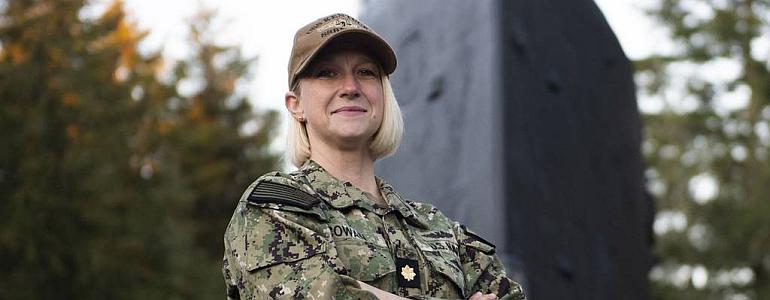 A decade after women were allowed to serve in the US Navy’s Silent Service, Lt. Cmdr. Amber Cowan has become the first woman to serve as executive officer on a submarine.
A decade after women were allowed to serve in the US Navy’s Silent Service, Lt. Cmdr. Amber Cowan has become the first woman to serve as executive officer on a submarine.
Lt. Cmdr. Cowan, who joined the Navy in 2010, reported for duty to the ballistic missile submarine USS Kentucky, based out of Naval Base Kitsap-Bangor, Washington, as its executive officer Nov. 12, as reported by Navy Times.
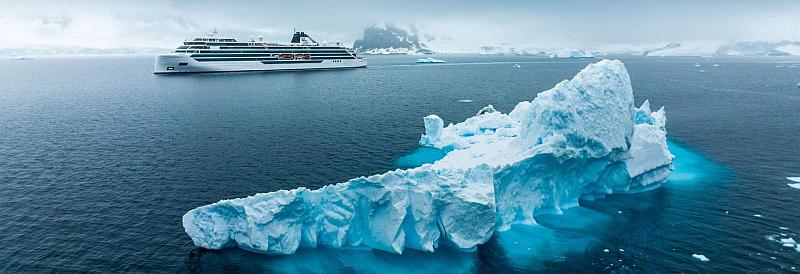 Viking Cruises announced that their expedition cruise ship Viking Polaris was struck by a “rogue wave” in a storm off Antarctica on November 29 at 22:40 local time. The ship was sailing towards Ushuaia, Argentina. One passenger was killed by the wave, while four others sustained non-life-threatening injuries and were treated by the ship’s onboard doctor and medical staff.
Viking Cruises announced that their expedition cruise ship Viking Polaris was struck by a “rogue wave” in a storm off Antarctica on November 29 at 22:40 local time. The ship was sailing towards Ushuaia, Argentina. One passenger was killed by the wave, while four others sustained non-life-threatening injuries and were treated by the ship’s onboard doctor and medical staff.
The ship sustained limited damage during the incident and arrived in port in Ushuaia on the afternoon of November 30. AFP reports that several windows were smashed on one side of the ship. Viking has canceled the ship’s next scheduled departure of December 5-17.
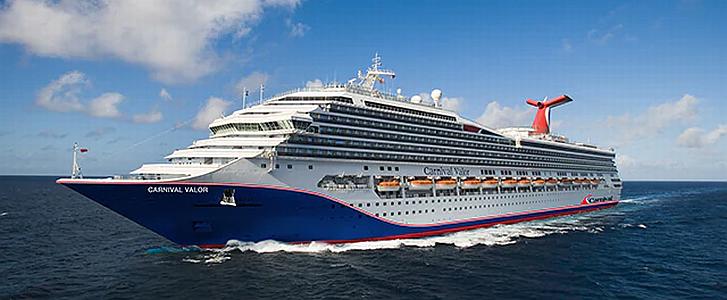 When we posted about a man who had been rescued in the Gulf of Mexico by the US Coast Guard after apparently falling off the cruise ship Carnival Valor, we were convinced that there was more to the story. It didn’t seem likely that anyone could have survived the fall from the ship and then treaded water for around 20 hours in 65- to 70-degree water, withstanding rain, 20-knot winds, and three- to five-foot waves.
When we posted about a man who had been rescued in the Gulf of Mexico by the US Coast Guard after apparently falling off the cruise ship Carnival Valor, we were convinced that there was more to the story. It didn’t seem likely that anyone could have survived the fall from the ship and then treaded water for around 20 hours in 65- to 70-degree water, withstanding rain, 20-knot winds, and three- to five-foot waves.
There had to be more to the story. It now looks like we were wrong. James Michael Grimes, 28, the man rescued was interviewed by ABC News and confirmed the account that he and his sister were drinking at a shipboard bar. At around 11 PM he left to find a restroom and did not return.
Grimes says that all he remembers is waking up in the water, with no memory of how he got there. Grimes said he believes the fall overboard knocked him unconscious. “The next thing I know… I regained consciousness. I was in the water with no boat in sight,” he said. Continue reading
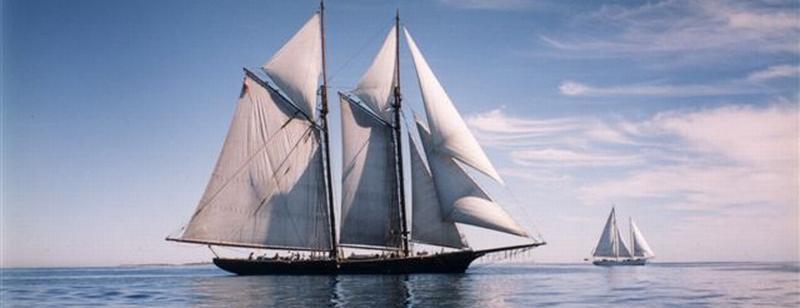
Photo: Susan S. Bank
After seven years of reconstruction and restoration in Boothbay Harbor, ME, the historic schooner Ernestina-Morrissey returned to her home port in New Bedford, MA earlier this week.
“It’s been a long time since we’ve seen the Ernestina-Morrissey sailing into New Bedford to her home port, so this is wonderful,” state Rep. Antonio Cabral said as the boat pulled into the harbor Tuesday.
The schooner was built in 1894 as the Effie M. Morrissey at the James and Tarr Shipyard for the Gloucester fishing fleet.
 When the 51,000 DWT Maltese-flagged tanker Alithina II sailed in ballast from Nigeria to Las Palmas, Gran Canaria she carried a most unusual cargo. Because she sailed in ballast and was riding high in the water, three stowaways were found sitting on top of the ship’s rudder by the Spanish Coast Guard. The three men had survived the 11-day voyage of more than 2,700 nautical miles sitting on the rudder with their feet less than a meter above the water.
When the 51,000 DWT Maltese-flagged tanker Alithina II sailed in ballast from Nigeria to Las Palmas, Gran Canaria she carried a most unusual cargo. Because she sailed in ballast and was riding high in the water, three stowaways were found sitting on top of the ship’s rudder by the Spanish Coast Guard. The three men had survived the 11-day voyage of more than 2,700 nautical miles sitting on the rudder with their feet less than a meter above the water.
The men were taken to a hospital in Gran Canaria and treated for moderate dehydration.

Robin Knox-Johnston in 2013
More news of orcas attacking sailboats in the Atlantic off the Iberian peninsula, in this case involving a sailing icon. Scuttlebutt Sailing News reports that a pod of orcas attacked Sir Robin Knox-Johnson while sailing his Farr 56 Sanjula, damaging the steering.
As the first person to perform a single-handed non-stop circumnavigation of the globe, and then later won the second Jules Verne Trophy, 83-year-old Robin Knox-Johnson is indeed sailing royalty.
Knox-Johnson recounted what happened to Scuttlebutt: On November 24 at 0835 GMT off the Spanish coast of Cape Finisterre (Lat 42 53.6N Long 009 30.3W), a pod of 7-10 Orcas surrounded my Farr 56 Sanjula and then began to barge into its rudder. This eventually broke a steering connecting rod.
Here is a well-done short video about the schooner Wyoming, one of the largest wooden ships ever built. Built as a collier in 1909 by Percy & Small in Bath, Maine, she was capable of carrying 6000 long tons of coal and had an economically successful fifteen-year career before foundering in a storm off Nantucket in 1924, with the loss of all hands.
The Wreck of the Schooner “WYOMING”, the Largest Wooden Ship in History
 Yesterday, the US Coast Guard rescued an unidentified passenger who had gone overboard in the Gulf of Mexico from the cruise ship Carnival Valor on a voyage from New Orleans to Cozumel. While most cases of passengers who fall or jump overboard from cruise ships end in tragedy, one Coast Guard officer referred to this rescue as a “Thanksgiving miracle.” Until more facts emerge, it certainly qualifies as a Thanksgiving mystery.
Yesterday, the US Coast Guard rescued an unidentified passenger who had gone overboard in the Gulf of Mexico from the cruise ship Carnival Valor on a voyage from New Orleans to Cozumel. While most cases of passengers who fall or jump overboard from cruise ships end in tragedy, one Coast Guard officer referred to this rescue as a “Thanksgiving miracle.” Until more facts emerge, it certainly qualifies as a Thanksgiving mystery.
Shortly after the Carnival Valor sailed from New Orleans on Thanksgiving eve, a man and his sister were drinking at a shipboard bar. At around 11 PM the man left to find a restroom and did not return.
The next day, his sister could not find him and notified cruise ship personnel that he was missing at around noon. After searching the ship, the US Coast Guard was notified that there was a man overboard at 2:30 PM. The ship reversed course to retrace its route.
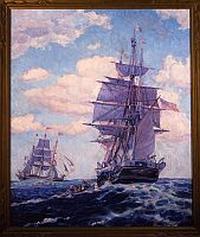 Happy Thanksgiving to those on this side of the pond and below the 49th parallel. (The Canadians celebrated the holiday in October.)
Happy Thanksgiving to those on this side of the pond and below the 49th parallel. (The Canadians celebrated the holiday in October.)
What do whaling ships, a child’s nursery rhyme, a female magazine editor, and Abraham Lincoln have to do with Thanksgiving? An updated repost.
Until the Civil War, Thanksgiving was a sporadically celebrated regional holiday. Today, Thanksgiving is one of the central creation myths of the founding of the United States, although not universally admired. The story is based on an account of a one-time feast of thanksgiving in the Plymouth colony of Massachusetts during a period of atypically good relations with local tribes.
The actual history of what happened in 1621 bears little resemblance to what most Americans are taught in grade school, historians say. There was likely no turkey served. There were no feathered headdresses worn. And, initially, there was no effort by the Pilgrims to invite the local Native American tribe to the feast they’d made possible.
Thanksgiving only became a national holiday in 1863. Before the celebration spread across the country, Thanksgiving was most popular in New England. On 19th-century American whaling ships, which sailed from New England ports, they celebrated only the Fourth of July, Thanksgiving, and Christmas. Of the three holidays, Thanksgiving may have been the most popular. On Norfolk Island in the Pacific, they also celebrate Thanksgiving, the holiday brought to the island by visiting American whaling ships.
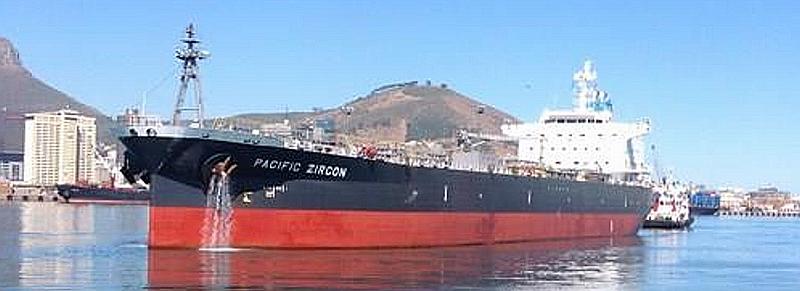 Last week, we posted about the drone attack on the 50,000 DWT product tanker Pacific Zircon, off the coast of Oman. Investigators sent aboard to assess the damage and to collect debris from the drone determined that the tanker was struck by an Iranian Shahed-136 drone, the same kind of bomb-carrying drone Iran has supplied to Russia in its war on Ukraine. Iranian drones were used by Yemeni rebels to attack Saudi Arabia and the United Arab Emirates earlier this year, the Navy said.
Last week, we posted about the drone attack on the 50,000 DWT product tanker Pacific Zircon, off the coast of Oman. Investigators sent aboard to assess the damage and to collect debris from the drone determined that the tanker was struck by an Iranian Shahed-136 drone, the same kind of bomb-carrying drone Iran has supplied to Russia in its war on Ukraine. Iranian drones were used by Yemeni rebels to attack Saudi Arabia and the United Arab Emirates earlier this year, the Navy said.
A Navy statement concluded that on Nov. 15, the explosive-laden aerial drone attacked Pacific Zircon at approximately 7:30 p.m. in the Northern Arabian Sea, tearing a 30-inch-wide hole into the back of the ship while subsequently penetrating and damaging internal compartments. The UAV’s explosive impact also damaged a shipboard boiler, potable water tank and life raft.
 LightSail 2, the Planetary Society‘s solar sailing spacecraft, is no more. On November 17th, the crowdfunded solar sailing spacecraft burned in a blaze of glory as it re-entered earth’s atmosphere after traveling 8 million kilometers (5 million miles) powered only by sunlight.
LightSail 2, the Planetary Society‘s solar sailing spacecraft, is no more. On November 17th, the crowdfunded solar sailing spacecraft burned in a blaze of glory as it re-entered earth’s atmosphere after traveling 8 million kilometers (5 million miles) powered only by sunlight.
“LightSail 2 is gone after more than three glorious years in the sky, blazing a trail of lift with light, and proving that we could defy gravity by tacking a sail in space,” said Bill Nye, CEO of The Planetary Society in a statement. “The mission was funded by tens of thousands of Planetary Society members, who want to advance space technology.”
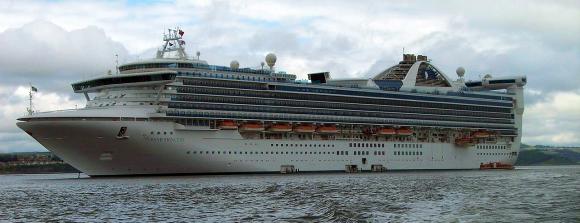 In the words of Yogi Berra, “It’s like deja vu all over again.” Masks and vaccination mandates are returning to the cruise industry, at least for many cruise ships calling in Australia.
In the words of Yogi Berra, “It’s like deja vu all over again.” Masks and vaccination mandates are returning to the cruise industry, at least for many cruise ships calling in Australia.
In March of 2020 at the beginning of the pandemic, 700 passengers and crew on the Diamond Princess became infected with the Covid-19 virus. The virus also spread across other cruise ships, ultimately resulting in the total shutdown of the worldwide shutdown of the cruise industry.
Since then with the advent of safety protocols including masking, testing and vaccinations, the cruise industry has restarted, benefitting from the pent-up demand. But the pandemic is not quite over. Two weeks ago, the Majestic Princess arrived in Sydney, Australia with 800 passengers who tested positive for Covid-19.
A belated happy birthday to Canadian singer/songwriter Gordon Lightfoot, who turned 84 the day before yesterday. Often referred to as Canada’s greatest songwriter, Lightfoot is also a sailor, having owned and sailed the 39′ Sundown and the 45′ Golden Goose. More than a few of Lightfoot’s songs are about sailing, ships, and the sea. One of his best-known is the Wreck of the Edmund Fitzgerald about the sinking of the US flag bulk carrier of the same name in November 1975.
In honor of Lightfoot’s recent birthday, here is a lesser-known song of his about another maritime disaster. He wrote and recorded the Ballad of Yarmouth Castle in 1969. The ballad tells the story of the cruise ship SS Yarmouth Castle which sank after catching fire in 1965 on a voyage between Miami and Nassau, with the loss of 90 crew and passengers.
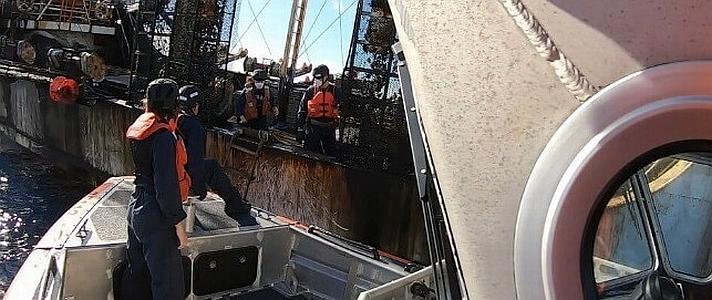 Having overfished its own coastal waters, China is aggressively deploying a global fishing fleet to exploit fishing grounds thousands of miles from its shores. The New York Times reports that over the last two decades, China has built the world’s largest deep-water fishing fleet, by far, with nearly 3,000 ships. The impact is increasingly being felt from the Indian Ocean to the South Pacific, from the coasts of Africa to those off South America — a manifestation on the high seas of China’s global economic might.
Having overfished its own coastal waters, China is aggressively deploying a global fishing fleet to exploit fishing grounds thousands of miles from its shores. The New York Times reports that over the last two decades, China has built the world’s largest deep-water fishing fleet, by far, with nearly 3,000 ships. The impact is increasingly being felt from the Indian Ocean to the South Pacific, from the coasts of Africa to those off South America — a manifestation on the high seas of China’s global economic might.
In July 2020, we posted that Ecuador raised an alarm after a naval patrol sighted a fleet of around 260 Chinese fishing vessels just outside the Galápagos protection zone. Naval patrols have been stepped up to monitor the Chinese ships. Chinese fishing vessels come regularly to the Pacific around the Galápagos, but in recent years fleets have been the largest on record.

Photo: Marine Traffic
The 50,000 DWT product tanker Pacific Zircon was struck by a bomb-carrying drone off the coast of Oman on Tuesday night. The ship is operated by Singapore-based Eastern Pacific Shipping, a company ultimately owned by Israeli billionaire Idan Ofer.
In a statement, Eastern Pacific Shipping said the Pacific Zircon, carrying gas oil, had been “hit by a projectile” some 150 miles (240 kilometers) off the coast of Oman.
“We are in communication with the vessel and there are no reports of injuries or pollution. All crew are safe and accounted for,” the company said. “There is some minor damage to the vessel’s hull but no spillage of cargo or water ingress.”
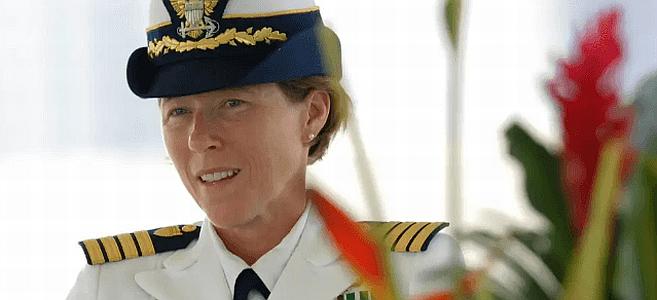 Congratulations to Rear Admiral Joanna Nunan, a retired US Coast Guard two-star admiral, recently appointed to be the superintendent of the US Merchant Marine Academy at King’s Point, NY, the first woman appointed as superintendent in the academy’s eight-decade history.
Congratulations to Rear Admiral Joanna Nunan, a retired US Coast Guard two-star admiral, recently appointed to be the superintendent of the US Merchant Marine Academy at King’s Point, NY, the first woman appointed as superintendent in the academy’s eight-decade history.
“Rear Admiral Nunan is uniquely prepared to lead and strengthen USMMA on every front,” said Maritime Administrator Ann Phillips in a statement. “She understands both the critical role USMMA plays in our economic and national security and the organizational transformations that are essential to ensuring USMMA prepares students in a safe and respectful environment to excel in a maritime industry undergoing rapid change.”
Rear Admiral Nunan retired this year as the Coast Guard’s Deputy for Personnel Readiness. In that role, she oversaw the Coast Guard’s HR functions, including recruitment and training, and she supervised the Coast Guard Academy and served on its Board of Trustees. She previously served as Assistant Commandant for Human Resources, leading the USCG’s diversity and inclusion efforts – including its effort to fix low retention for female servicemembers.
